The Vision is one of the biggest surprises to come out of Marvel Comics in years. The company announced the android would get his own comic, just as the character was about to appear in Age of Ultron, so fans expected a light, action-y series to cater to movie fans. The Vision took that preconception and smashed it to pieces.
There will be spoilers ahead for The Vision Vol. 1.
Instead, The Vision — created by Tom King, Gabriel Hernandez Walta, Jordie Bellaire and Clayton Cowles — is not just a story quite unlike anything The Vision has experienced as a character before (although he did previously have biological children with his former wife, the Scarlet Witch). More to the point, it’s also totally unlike any superhero comic Marvel has released in years.
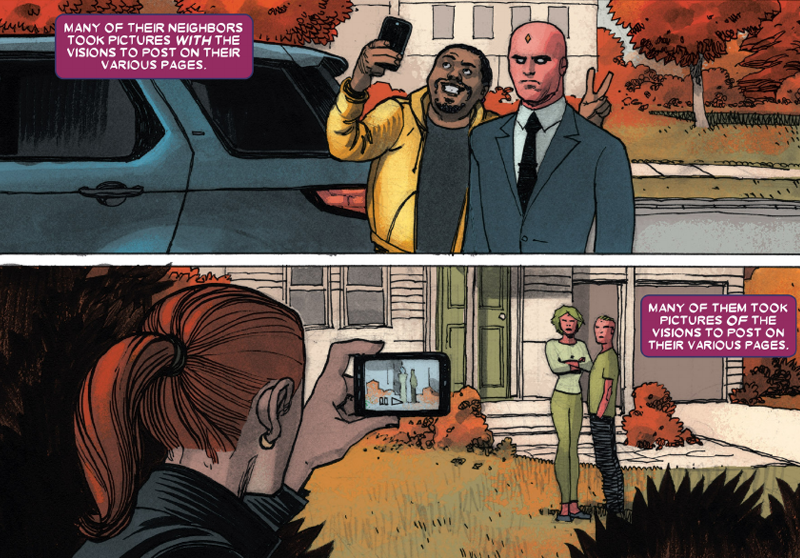
The Vision isn’t a wacky superheroic action series where the Avenging Android comes home to his robot family after a hard day’s avenging — it’s a dread-laden surburban drama about murder, lies, what it means to be human and the inevitability of heading down a self-destructive path. It just happens to star a synthezoid man, and the wife and two kids he decided to make for himself one day.
That dreadful inevitability is what makes The Vision so enthralling to read, month after month. King’s masterful sense of pacing, and the stark, muted art work from Walta’s lines and Bellaire’s colours, come together to paint a world with an overwhelming sense of atmosphere. Specifically, the atmosphere of a gruesome, page-turning thriller. Reading The Vision is almost like that lingering gaze you give to a car accident as you pass by — you don’t want to see something tragic and horrifying unfold in front of you, but a morbid sense of curiosity compels you to stare anyway.
How The Vision achieves this atmosphere is both exceedingly simple and yet marvellously executed. First of all, it separates its characters into three distinct story strands — the stories of The Vision himself, his wife Virginia and the twin children of the family, Viv and Vin — and follows them as they each make a terrible mistake, until all of those mistakes begin intermingling to create one horrendous situation.
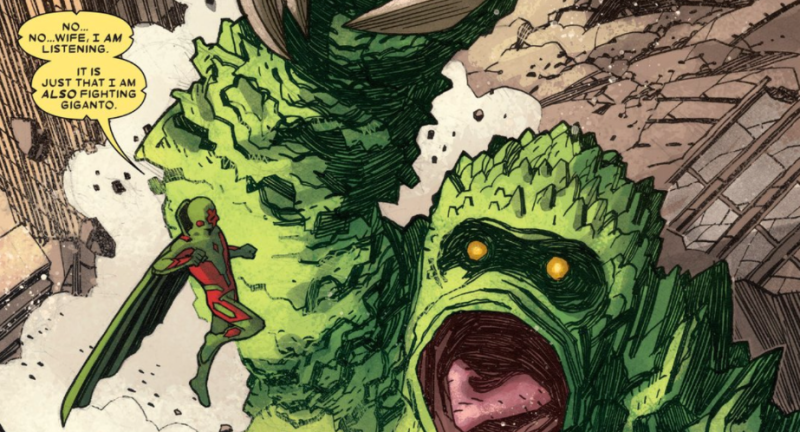
The Vision’s mistake is pretty simple — out of nowhere he creates three godlike synthezoid family members, sets up a dollhouse for them and then promptly wanders off. He expects everything to be completely fine, relying on the subroutines and memories he has given them to keep them behaving properly as they interact with humanity.
Despite being the title character, the Vision is barely in The Vision. When he does appear, it’s to show him busy working with the Avengers (a brief comedic respite amidst the dread that pervades the comic elsewhere). And when he is with his family, it’s only for brief periods of time — playing catch with his children, or intervening in a school matter. His presence is limited, but the impact of his decision to create this family, and the nightmare that ensues because of it, is keenly felt. And tragic, because the horrors the readers have seen his family go through have yet to come crumbling down around him.
Vin and Viv’s mistake is all too familiarly human: It’s the attempt to fit in. Every teenager struggles with identity and fitting in, but not every teenager is a highly advanced artificial intelligence who can phase through solid objects and shoot lasers out of their head. Vin and Viv try and try, even when the world around them constantly reminds them of their inhumanity and their difference, and the stress of it is already starting to be felt.
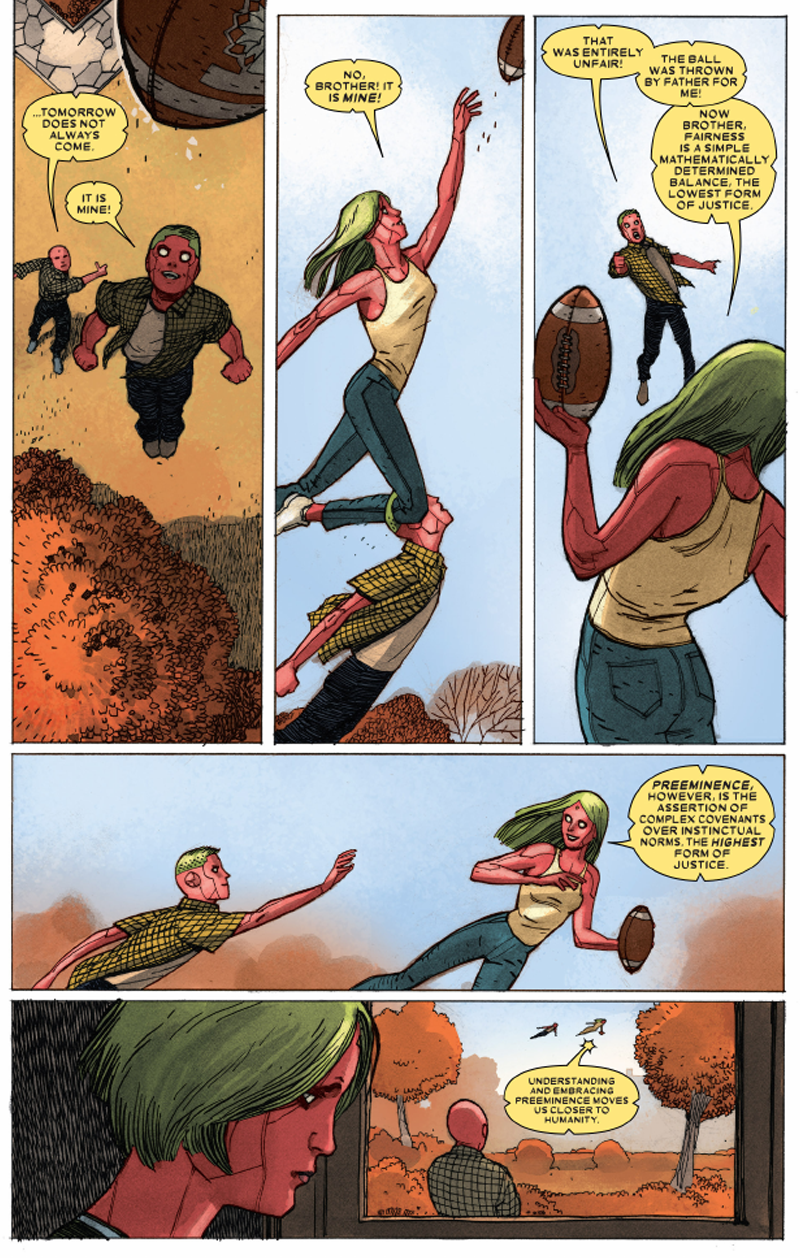
Vin struggles with school, while Viv struggles in her attempts at a social life. But it leads to some pretty fascinating moments between the two siblings, where they argue about whether or not they should attempt to blend in or stand out for their strengths. It is, like the rest of the book, a simmering pot bound to boil over later on, but their stark debates through the eyes of children — not quite children — act as a symbolic metatextual narrative for the series that makes their struggle to be who they want to be intriguing to behold. Viv and Vin’s debates about what it means to be human, and how they should adapt into a society of people so wildly unlike them, become the very things that drive the whole series.
But it’s The Vision’s wife, Virginia, who is arguably the star of The Vision. And her mistake is the most drastic and impactful, although it’s similar to her children’s and husband’s, in that it is driven out of an innate sort of humanity: The desire to protect her family and its place in a world that doesn’t really accept them.
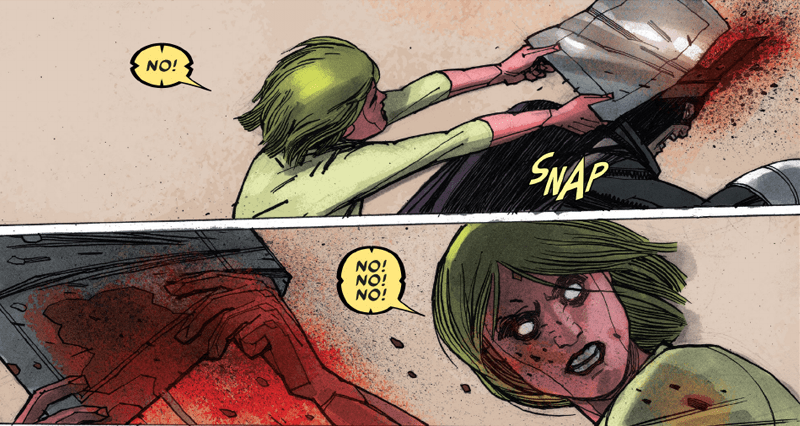
This first manifests at the climax of the first issue, where Virginia murders the supervillain Grim Reaper in a fit of rage after he attacks the family in their home, prompting Virginia to hide the body and make her children swear never to tell the Vision about it. This incident has spiralled through the other issues of the series, as Virginia discovers that someone filmed her burying Reaper’s remains, and begins blackmailing her.
Virginia’s impulses grow further and further out of control. Her need to defend herself, without The Vision acting as a moral guide for her, eventually sees her responsible for the death of her blackmailer and his son. (Another secret to keep.) While Viv and Vin’s detached, almost emotionless debate about their place in the world is unnerving to us, Virginia’s humanity — and how it’s reflected in her downward spiral into a suburban killing spree — is the most potent thing in The Vision. Virginia’s tragedy drives the whole book and makes it compellingly tense, as the situation around her worsens and worsens.
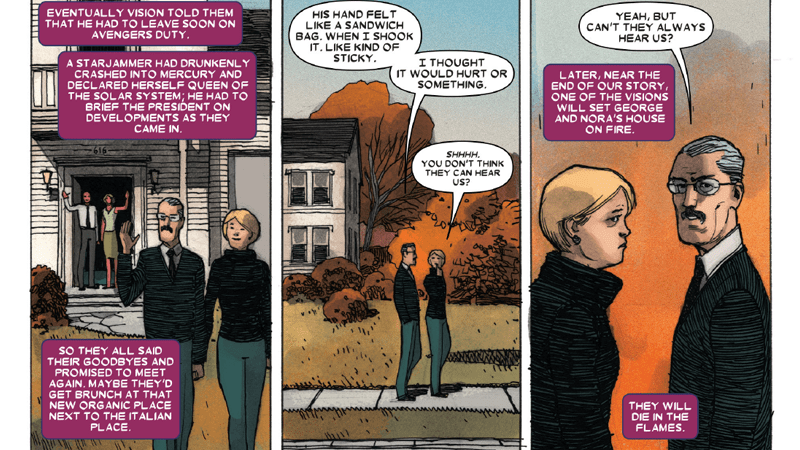
But The Vision‘s second secret weapon in creating a sense of inescapable dread is a character who’s never seen, but heard from in every issue so far. The Vision‘s storytelling is dominated by a prescient narrator — a constant reminder that no matter how dark and depressing things are now, things not only can get worse, but they will. This detached voice gives the book a sense that you’re watching a story that’s already reached its terrible conclusion, which only further drives home the tone of despair and inevitability that makes The Vision such a unique reading experience for a Marvel comic.
The narrator is not just there in the bad times, but even in the lighter moments, the brief pieces of hope, and their cold and distant tone (not unlike the stilted speech patterns of the Visions themselves) skewers anything that might make you feel anything other than dread. Early on in the first issue, the Visions’ next door neighbours greet the newly-moved in family. As they leave, the Narrator simply states that by the end of the story, one of the Visions will have burned their house down and killed them.
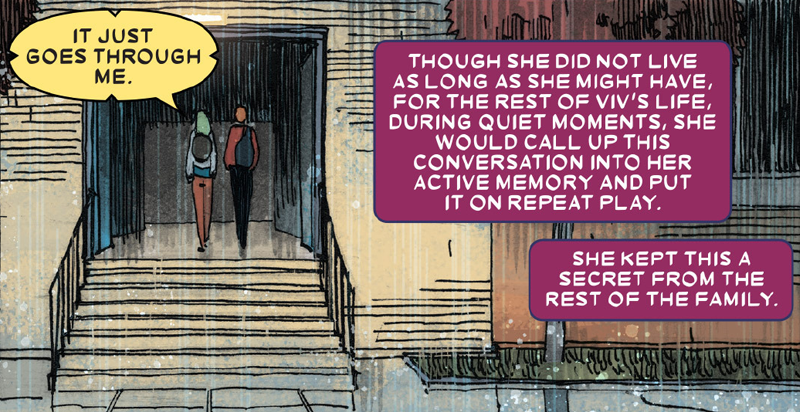
In another, as Viv bonds with a classmate at school, the Narrator makes reference to it being a moment that will live with the young synthezoid for the rest of her short life. It hammers home that “car crash” feeling I mentioned earlier — instead of reading to see if there’s a light at the end of the tunnel, you read just to see how dark this black path The Visions are on can really get.
You might have read all that and wonder why this is even a Vision comic. Heck, even the Vision we see elsewhere in Marvel’s comics, like in All-New, All-Different Avengers feels so radically different to the sad figure we see in his own series. And after all, the Vision’s whole origin is about a godlike character who took that power and did something good and noble with it. But The Vision is about that godlike character taking that power, imbuing it in other people and making the mistake of assuming that nobility will happen again.
That complete tonal difference, and the way it holds up a subversive mirror to everything The Vision has been about as a character for years, is what makes The Vision unlike anything we’ve seen from Marvel in such a long time. This comic is laser-focused in its intent and the tragic story it wants to tell, reshaping the legacy of the Vision as a character. The Vision is a dark spot in an otherwise relatively bright and breezy Marvel universe. And that stark difference makes this comic stand out in fascinating, uncomfortable ways — much like the Visions themselves.
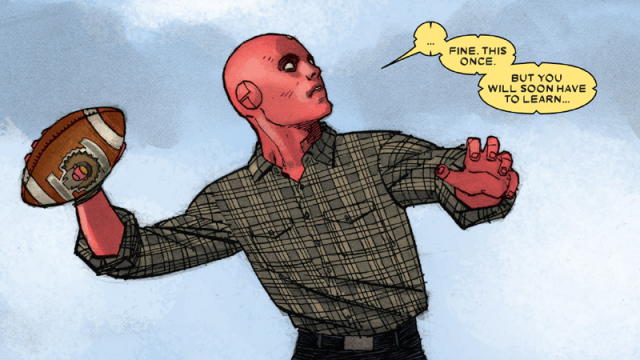
Comments
9 responses to “Marvel’s The Vision Is Telling A Story Unlike Any Superhero Comic I’ve Ever Read”
I’ve got to say, as a man who’s never read a western comic (anything not manga…), and has always been daunted by the long ass history of superhero comics, these articles are awesome for providing summaries to these storylines.
Fell off the comics wagon a while ago, but I like keeping up with some of the interesting stories.
So I agree, these articles are excellent.
Jumping in for the first time can be a bit overwhelming, but I feel like enough stories are self-contained or explained well enough that you don’t have to really worry about not knowing 50+ years of story. If something is more complicated than a “Don’t you remember that time you did that thing?” there’s usually a little note telling you where to look for more info.
I’m not reading this comic, but nothing I’ve seen of it sparks my interest. Apart from the creepiness and, lets face it, total insanity of creating life solely for the purpose of living out some bizarre Norman Rockwell fantasy, it’s pretty clear where the story is heading. Spoilers, It Will All End Badly. Why would I want to read a story about a hero checking his sanity at the door and then the descent of four people into madness and despair? That’s not something I’m ever going to be interested in seeing.
What gave it away? Was it the part of the article where it talks about how the narrator basically says it’s going to end poorly?
Couldn’t the same be said for “lives happily ever after”? Why read about trials and conflicts if you know all will end up well in the end?
Because a good story is about the journey, not the destination 🙂
I’m guessing you aren’t into Lovecraft either?
Knowing a story doesn’t end happily doesn’t mean it can’t be an incredible ride. For all their flaws, the Star Wars prequels weren’t held back by the fact that everyone knows Darth Vader turns out evil.
Take movies like Memento or The Usual Suspects, to name a few. These are movies that start at the culmination of events, and then rewind to the beginning – you basically know how it’s going to play out, but watching how they get there is fascinating.
Will finally check this out I think. Worst part of comics is waiting around for arcs to wrap up because it’s really no fun reading 20 pages here and there of a million comics, story loses impact and u forget what’s going on. Now there’s a good chunk to get stuck into ill give it a crack
This Vision comic sounds pretty depressing really, think I’ll skip it.